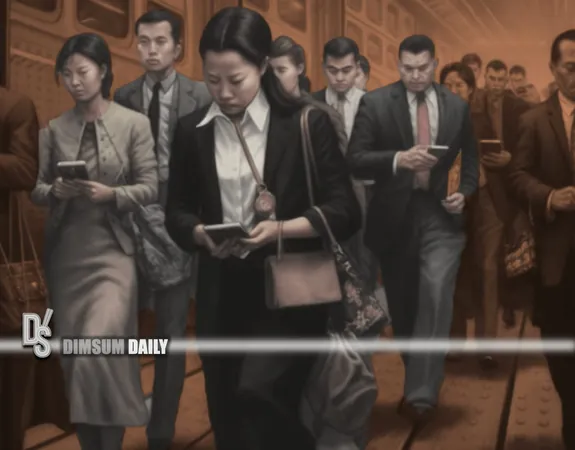
Hong Kong: The City Where Self-Servitude Thrives
2025-04-17
Author: Jia
A Modern Tale of Voluntary Bondage
On any given morning in Hong Kong, the daily commute unfolds like a scene from a dystopian novel. Office workers pile into MTR trains, their gazes glued to screens, while wealthy socialites scour department store displays with the intensity typically reserved for ancient alchemists. Meanwhile, bankers relentlessly chase after quarterly bonuses, sacrificing sleep and health, while in the buzzing streets of Mong Kok, teenagers barter their self-worth for fleeting social media likes. Two millennia after Seneca’s reflection on personal chains, Hong Kong has sculpted a new kind of servitude that would baffle even the most hardened Romans.
Three Layers of Enslavement in a Glittering Cage
This modern bondage reveals itself in three concentric layers. The outermost ring is economic enslavement—where exorbitant property prices demand the equivalent of 21 years of the median income just to enter the housing market. Work cultures here glorify 60-hour weeks, and middle-aged professionals liken themselves to "human ATMs" funding tuition and mortgages or "corporate battery hens" churning out endless presentations. The government’s touted social mobility statistics tell a stark truth: less than 4% of children from the lowest income brackets rise to affluence, creating what sociologist Lui Tai-lok aptly describes as a "caste system with credit cards."
Digital Chains: Psychological Servitude
The second, more insidious layer is psychological bondage to digital overlords. With about 94% of the population connected and the average person peering at their phone 78 times a day, Hong Kong's citizens have become modern zombies. This fixation on screens has gotten so severe that warnings about falling onto the platform now echo in multiple languages. The act of connecting has soured into cognitive colonization, with individuals unwittingly trading real experiences for the quick dopamine fixes of manipulated social media envy, leading to an average of 4.7 years spent on these platforms.
The Consumption Cult: Feeding the Inner Beast
At the heart of this modern malaise lies the primal slavery to our desires. From frantic queues for limited-edition toys to extravagant HK$28,000 meals that are more about status than sustenance, consumption has morphed from mere economic activity into a sacred ritual. This phenomenon, termed "affluenza," describes a societal sickness where luxury logos act as armor against the fear of mortality.
Stoicism: The Path to Liberation
But there is hope! Stoicism serves as a powerful antidote to these self-imposed shackles. By focusing on what we can control—our choices and attitudes—versus what we cannot, like property prices or social media algorithms, Hongkongers can unlock their own freedom. Embracing digital minimalism through practices like a 30-day "screen fast" can help people reclaim their time and mental space. Apps aimed at promoting productive time away from screens, along with more traditional methods like reading physical books, help in the quest for a clearer mind.
Reimagining Wealth: The New Path Forward
Financial liberation requires a fresh perspective on prosperity. The FIRE (Financial Independence, Retire Early) movement is gaining traction, encouraging locals to choose frugality over facade. Concepts such as "geographic arbitrage"—earning high salaries while living elsewhere at lower costs—challenge the mistaken belief that cramped apartments signify life's ultimate achievement. As investment guru Warren Buffett points out, "True wealth is measured by what you don’t need to buy."
Quiet Rebellions Against Consumption as Identity
More and more millennials are embracing "stealth wealth"—opting for quality without labels. Initiatives like community pantries for reducing food waste and clothing swaps in repurposed markets signal a subtle uprising against consumerist identities. The usage of public libraries has skyrocketed by 22% since 2023, showcasing a collective effort to shift away from mere consumption.
A Silent Revolution on the Horizon
The journey to Stoic self-mastery in Hong Kong won't mirror Seneca’s peaceful Tuscan musings. It will be marked by small, defiant acts: a banker opting out of overtime to attend a child's recital, a student journaling instead of scrolling, a family choosing a hike over shopping. Each decision chips away at the self-forged chains. As the light hits Lion Rock, a choice presents itself: continue as willing captives or echo Seneca, who recognized that "no chains are heavier than those we grasp willingly." The city's hope lies in the hands of its people – which path will they choose?




 Brasil (PT)
Brasil (PT)
 Canada (EN)
Canada (EN)
 Chile (ES)
Chile (ES)
 Česko (CS)
Česko (CS)
 대한민국 (KO)
대한민국 (KO)
 España (ES)
España (ES)
 France (FR)
France (FR)
 Hong Kong (EN)
Hong Kong (EN)
 Italia (IT)
Italia (IT)
 日本 (JA)
日本 (JA)
 Magyarország (HU)
Magyarország (HU)
 Norge (NO)
Norge (NO)
 Polska (PL)
Polska (PL)
 Schweiz (DE)
Schweiz (DE)
 Singapore (EN)
Singapore (EN)
 Sverige (SV)
Sverige (SV)
 Suomi (FI)
Suomi (FI)
 Türkiye (TR)
Türkiye (TR)
 الإمارات العربية المتحدة (AR)
الإمارات العربية المتحدة (AR)